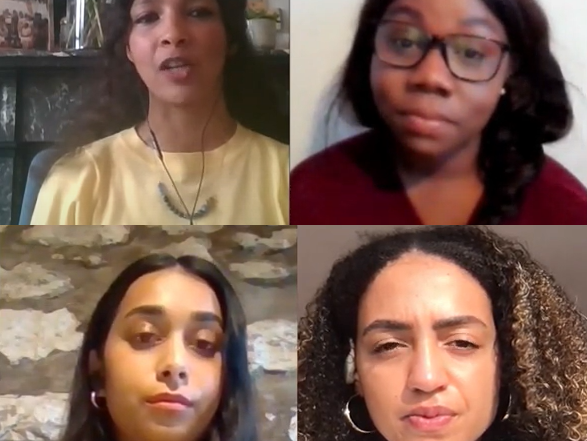
The UK media’s first dedicated race correspondent Nadine White has said each publication “has its good moments” on the reporting of issues affecting ethnic minority communities, summarising it as “swings and roundabouts”.
White, who was appointed to the role at The Independent six months ago, said UK newsrooms have a “lot more work to do” despite holding regular panels and discussions on the issue of diversity in the industry.
Speaking at the NCTJ’s equality, diversity and inclusion conference on Thursday, White (pictured, top right) said the media could do a better job at conveying and explaining issues that matter to people of colour to the white population if editors collaborated and listened to their more junior colleagues more.
She said: “It’s important for editors to listen to particularly reporters from diverse backgrounds who have a greater insight into how to tell those stories… I think what happens more often than not unfortunately is that these conversations aren’t had.
“It’s more a case of the reporter who would be in a more junior position being told how to put across those stories and how to go about reporting it.”
[Read more: How industry leaders can improve newsroom diversity]
White added: “Hiring [and] recruiting journalists from these communities is also very important and that’s something that isn’t happening enough.
“There’s often discussions and panels year in year out about how to improve diversity in the newsroom but unfortunately seeing those discussions translate into tangible action and seeing an uptick in newsroom diversity continues to be an issue and continues to lag behind and I think when newsrooms become more diverse and editors’ attitudes and the approach to stories changes in terms of listening to reporters we will be able to see a better reach.”
White told the panel that generally coverage around race issues in the UK is “not always consistent and it’s not always reported on in a nuanced way”, adding it has “swings and roundabouts, ups and downs”.
“There’s a lot more work to do collectively across each newsroom and I don’t think any publication should be getting complacent at this time. I think it’s important to keep on doing the work and keep hiring people from diverse communities and marginalised groups in order for the news to be representative of the audiences that it’s trying to reach.”
White agreed with Georgia Chambers (pictured, bottom right) who said that although diversity has improved in the lower levels of journalism the editors and people who set the news agenda still tend to be “overwhelmingly white”.
“I think that’s quite clear with the news agenda today,” Chambers said. “There’s definitely a perspective that is missing.”
[Comment: Have older workers been forgotten in drive to improve media diversity?]
Bloomberg deputy London bureau chief Ruth David (pictured, top left), who hosted the session, said there was still “so much that needs to be done” on diversity in the industry.
But, she added: “Even compared to ten years back or five years back this industry has become a better place, I would say, for people of colour and we keep trying to change it bit by bit and day by day.”
Asha Patel, a reporter at Reach website Leicestershire Live who started on the Facebook-funded community news scheme, told the panel it can be “harder to push and pitch certain stories” when the majority of the newsroom is white.
But she encouraged others to “take that extra step” to explain why a story is relevant for a particular community and put it in cultural context to ensure it is not “brushed off”.
Patel (pictured, bottom left) added that her biggest concern during the pandemic was that “people in the newsroom who may struggle to have a voice would find it a lot harder now working from home”.
“I think that it’s important to constantly pitch those stories even if they are getting shut down and keep a list of them and go back and explain why they are important,” Patel said. “It’s a shame but sometimes you have to do a bit of the extra legwork when you’re pitching a story that might get overlooked.”
Latest diversity coverage on Press Gazette:
- Survey finds growing UK journalism workforce of nearly 100,000 still lacks ethnic diversity
- TBIJ launches People’s Newsroom to boost community journalism and improve diversity
- Society of Editors ‘determined to lead from the front’ on diversity, says new boss
- Diversify newsroom campaigner says jobs go to privileged white colleagues who don’t need to apply
- Comment by Kuba Shand-Baptiste: Burden of fixing racism in the media should not sit with victims
Email pged@pressgazette.co.uk to point out mistakes, provide story tips or send in a letter for publication on our "Letters Page" blog

